Today, May 13, 2011, is the 150th anniversary of railways in Pakistan as the first track that became functional in areas which now comprise Pakistan was inaugurated on May 13, 1861 (this seems to be the season for 150th anniversaries!).
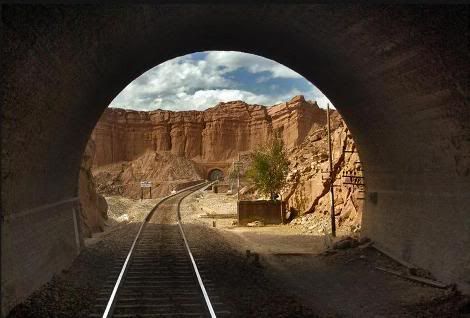
The photo above shows railway tunneling in Bolan Pass. The photo is credited to Agha Waseem.
The section that was inaugurated on this day 150 years ago was the 173 km long track between Karachi City and Kotri. At ATP we’ve already covered the inaugural event with a dedicated post (here) therefore I will not go in too much detail. I’ll rather delve into what Pakistan Railways could’ve been and what it could still be.
Following is an advertisement of Pakistan Railway which was published on the 1953-54 year book of PR by the Railway Division, Government of Pakistan.
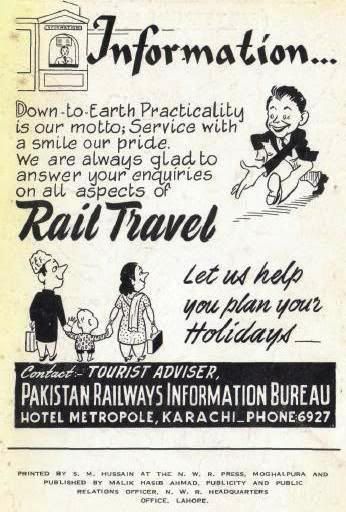
I believe most of our readers know that Pakistan Railway is one department which has been in red for several years. Infrastucture at several places is literally 150 years old with a dire need of rehabilitation. Rolling stock has become a laughing stock with failing engines and aged coaches.
The photo below shows an all-steel French rake of 8-Down Tezgam on its maiden run at Lahore in 1953. Tezgam has a Karachi-Rawalpindi route.
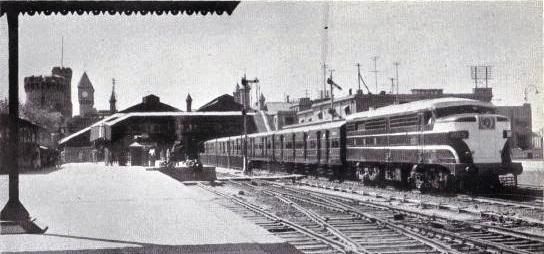
What needs to happen in my opinion is the immediate rehabilitatation of track starting with Karachi-Peshawar and Sukkur-Quetta-Zahidan routes. Freight and cargo should be handled by railway instead of road transport because that is where the sustainable income for Railway can come from. I am sure it is easier said than done because over the years road and highway infrastructure in Pakistan has become pretty decent where as Railways in comparison has declined. Therefore why would a trader or a company move its freight business to railways unless Railways can better itself over road transport and provide a healthy competition. Since Railways is a Govt owned department therefore patronage from Government will be needed for its upgrade just like National Highway authority has successfully done for major highways in Pakistan.
Following is another historic photo showing an all steel coach from France getting unloaded at one of the new jetties of Karachi Port in 1952.
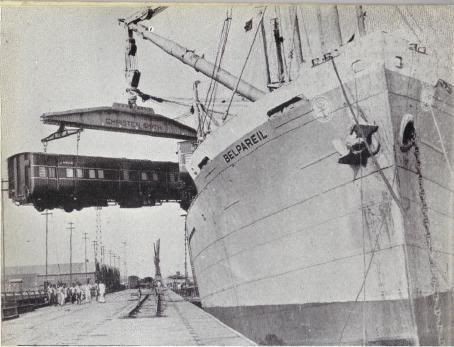
One more aspect that I want to talk about is the tremendous potential of tourism that Pakistan Railway has to offer. Several sections of Pakistan Railway especially those in Khyber-Pakhtoonkhwa and Baluchistan are Engineering and architectural marvels that can bring tourism to Pakistan from far and away. Sounds like a far cry right now but with ample security and comfort for passengers it is indded a possibility. Up until few years ago Pakistan was also one of the last few destinations in the World with working steam engines. Tourists used to flock here from all over the world to take rides in last working steam trains. This tourism can be revived with some Government patronage – I would also go as far as to suggest something like Orient Express Pakistan on Zahidan-Quetta-Lahore-Peshawar route.
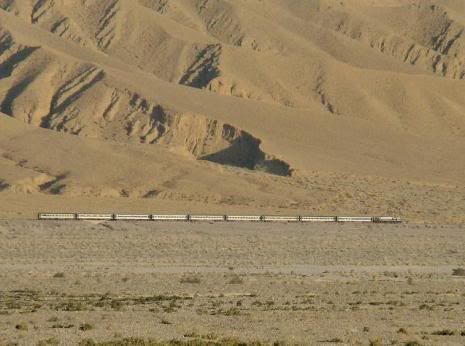
The photo above is a distant shot of a train between Sibi and Mach. The photo is credited to Agha Waseem.
On another related topic, couple of months ago there was news that the electrified rail section between Lahore and Khanewal is being torn down because there is not enough electricity and electric locomotives to run electric trains. This was a sad news that hit close to home. I know a cousin of mine who worked as an electrician on the construction of Lahore-Khanewal electrified section in the 1960s. So many people’s hardwork had gone in keeping this wonderful infrastructure built and kept. It feels sad to see it falling apart.
I want to request to our readers that whenever they take ride in Pakistani trains – take care of is rolling stock and infrastructure. No litter and no political graffity on trains. It is one heritage which is worth preserving and be proud of.
And another thing I am proud of is how over the years at ATP we have been able to build an encyclopedia of Pakistan Railways. Please see the list of our posts related to Pakistan Railways below and consult any of these for more information.
ATP’s Posts on Tramways and Railways in Pakistan:
1. Journeys to Remember: Quatta-Lahore by Rail in 1925.
2. Journeys to Remember: Karachi-Peshawar by Rail in 1950s
3. Ghora Tram: Historic Horse Tram Returns to Gangapur
4. Karachi Tramway of Yesteryears
5. Khyber Pass Railway
6. Bolan Pass Railway
7. The Trans-Balochistan Railway
8. Changa Manga Forest Railway
9. Lansdowne Bridge, Sukkur
10. Railway Bridge on Indus at Attock
11. Khojak Tunnel
12. Chappar Rift
13. Karachi Circular Railway (KCR)
14. Zhob Valley Railway (ZVR)
15. How the First Locomotive Reached Lahore
16. 3000hp Iron Horses of Pakistan
17. Lahore Rapid Mass Transit Rail Project
18. A Phoenix Rises From the Ashes of Bakhshapur
19. ek masla hai… A Railway Runs Through It
20. Ava Gardner in Lahore for Bhowani Junction
21. The Meter-Gauge of Sindh
22. Indus Flotilla Company
23. Karachi to Kotri: First Railways in Pakistan
24. Pakistan Railway on the West Bank of Indus
25. SPS#3157: Pakistan’s Gift to the People of Britain
26. List of Railway Stations of Pakistan


















































To bring the Pakistan Railways out of the current quagmire and to turn it into a profitable business organization, drastic changes are required. Some of the suggested changes are presented in the following. These changes would be difficult to implement at the outset under the prevailing political and social climate in Pakistan. But in my opinion, with a firm resolve, a clear-cut direction, a persistent effort and a consistent approach that are absolutely essential for this task, a turnaround can undoubtedly be achieved and the Railway can once again be a valuable asset for Pakistan..
1. Pakistan Railways should be operated as a business and not as an institution. It should concentrate only on its core function i.e. to provide a safe, reliable, efficient and cost effective transport service to passengers and goods.
All its non-core activities (i.e. not directly related to running of trains), such as owning and managing hospitals, dispensaries, schools, providing employee accommodations, hostels, canteens, and discount stores etc., should be handled completely separately from its core function, or simply given up by out-sourcing to those who are experts in their respective fields.
In earlier days, many locations served by the Railways were rural in nature, where such facilities were not available and so the Railways provided them for their employees. However, now most of these locations have developed into urban areas, and such facilities (particularly hospitals, schools and discount stores) are provided by government bodies or private enterprises and are now available for public at large, and should not be duplicated or supplemented any more by the Railways.
2. Pakistan Railways should be run from top-down, by carrier railroaders and without any political influence, affiliation, or interference. These railroaders must be competent personnel who understand the complex inter-relationship of various disciplines (such as civil, mechanical, electrical and telecommunications engineering, transportation, safety, economics, accounting, business administration, human relations, industrial relations, labor relations, etc, to name some of them) that comprise a modern railway. Anyone placed in the top echelon of the Railways who is naïve to its intricate operation, would continue to cause the fiasco that is being seen at present time.
3. Though corruption seems to be everywhere in Pakistan, it is said to be particularly rampant in the Railways. Some of the examples appear to be bribery in seeking employment, nepotism, political appointments, misappropriation of funds, kickbacks in contracting, purchasing and construction, in ticket sales and ticket-less travels, pilferage of customers’ goods and railway property, receipt/ disbursement of salaries of non-existent employees and collecting pensions of deceased pensioners, forging information/ records of work progressed or completed, making personal use of railway employees, equipment (such as vehicles) and property (such as inappropriate use of railway dwellings and rest houses), other forms of graft and so on.
Corruption needs to be tackled at all levels and in all areas. Railways should adopt a no-tolerance policy to deal with this terrible affliction i.e. anyone caught and charged with corruption must be summarily dismissed from the Railways service. Stringent enforcement of this policy would be necessary to yield fruitful results.
4. Present Pakistan Railways’ organization should be reviewed and streamlined in terms of the reporting relationships between and among different Divisions, Departments, Production Units and Headquarters Office. Similarly the role of the Railway Board with respect to Pakistan Railways as well with respect to PRACS and RAILCOP should also be reviewed and where necessary be modified. PRACS needs to look outwards to seek consultancy opportunities abroad particularly in Africa and Middle East. RAILCOP has done good work in carrying out several projects but it needs to better the quality of its end product.
The current Pakistan Railway’ establishment (i.e. persons employed, 83,868 in 2009-2010) is inordinately huge in regards to other railways of the World when the comparison is made with respect to the size of its network. The size of its establishment should be reduced significantly by attrition, by preventing duplicated, superfluous and wasteful efforts, by combining and re-aligning certain activities, out-sourcing non-operational activities, and by introduction of less labor involving technologies and adopting railways’ best practices. Where possible the layers of management should be reduced. In general, the decisions should be made at the levels to which they belong and not passed on to other levels.
The first line supervisors should be empowered to make decisions on matters that directly affect their work and their workers. They should also be allowed to participate in decision making process that would influence the overall destiny of the Pakistan Railways by encouraging their input. They would contribute invaluable ideas for betterment of the Railways. This would inculcate greater sense of involvement, commitment, responsibility, and dedication in employees towards the Railways which are so demoralized under the present conditions.
5. Pakistan Railways’ functioning should be open and transparent. Each railway position should be justifiable and should have a written job description that clearly spells out duties, responsibilities and challenges of that particular position. Performance of the employee should be appraised (and rated such as whether his/ her performance was excellent, exceeded expectations, satisfactory, below satisfactory or poor etc.) periodically in accordance with his/ her job description and from this necessary feedback should be provided to the employee along with appreciative, corrective or other remarks and any remunerative award. The process should be vivid, frank, fair, and impartial, and should be fully documented. The appraisals should be carried out at least once a year and more often if deemed necessary and conducted by the employee’s immediate supervisor, if possible, in the presence of other superiors and with a representative of personnel department. Promotions/ demotions/ other necessary actions should be the natural consequences of this process and upon successful completion of any mandatory training requirements.
6. Pakistan Railways should make concerted efforts to achieve added productivity, safety, reliability, and efficiency gains, cost effectiveness and on-time train performance through introduction of more computer based technologies in the areas of resource (i.e. labor, material, equipment and fixed property etc.) management, planning and programs developments, engineering and operational analyses, train control and car tracking systems, accident prevention, infrastructure condition monitoring, budgeting, accounting, statistical data bank and various record keeping activities etc. Understandably, some work has been carried out in stores inventory management, payrolls and statistics, however, much work is needed in many other areas.
7. Safety of public, employees, operation and property in that order should be paramount aspect of any railway organization. Major accidents such as at Sahiwal – Sept. 1957, Liaqatpur – Aug. 1972, Sukkur – Jan. 1990, Khanewal – March 1997, Jhang – Dec. 1997, Wah Cantt. – Sept. 1999, Ghotki – July 2005, Mehrabpur – Dec. 2007, and Gujar Khan – Nov. 2008 that not only resulted in much loss of innocent lives but also caused considerable damage and disruption. These are reported in the news media. However, there are many other accidents that do happen but are not reported or investigated and thus are not known to the public.
Railways must report and adequately investigate all accidents whether they are major, medium or minor in nature, to determine their causes and to take necessary measures to prevent their reoccurrences. Railways should publish its accident statistics by different categories (i.e. damage, lost time, injury, fatality etc; train, shop, yard, worksite, office etc; type of injury: head, eye, hand, foot, back, leg etc.) on a regular basis, and make this information available for the benefit and use of the interested parties.
8. Several railway assignments are quite stressful. Of particular mention are those which involve encountering hazards frequently, working protracted hours without proper rest, often required staying away from their homes, addicted to substance use, receiving ambiguous directions and of course work places where complacency reins. These situations could exist any where; however, they are experienced more in operating and shop areas of the railway and result in many accidents.
Pakistan Railways has done a great deal to provide welfare to its employees. More could be done in this aspect to relieve the work related stress by providing rest areas, recreational facilities and improving the working conditions at the outpost locations.
9. Railways are operating in a very competitive environment all over the world. Their competition is with other modes of transportation for goods and passengers, particularly, with trucks and buses respectively. This competition is inevitable. The competitors’ better performance should not be used to find excuses but should be considered as an opportunity and as a challenge and to gear up for better quality of service. Therefore, Pakistan Railways’ business unit should be very aggressive. Railways have an obvious advantage of long and mass haul of goods. Railways are also environmentally friendly (less carbon emissions) and relatively cost effective. However, they provide station (terminal) to station service and cannot provide door to door service (as is often preferred by the customers) like trucks unless the Railways has intermodal capability of its own. The Railways, therefore should builds up partnerships with trucking outfits to enable its customers a door to door service.
Another aspect of marketing is to reach out to the customers and meet them on a regular basis to discuss customers’ concerns about Railways’ service and seek their feedback/ input for improving the service. Similarly, for passengers, to attract them, group travel package and mid-week travel rates should be instituted at discount fares. The Railways employees at the front-end should be well informed, helpful and courteous to the customers. Sometimes, they need to go out of their way to assist / entertain customers to attract or maintain the business.
Railways should work on better image building as well by regularly advertising in the media, about the services it provides and about the advantages of its services to its customers in comparison to other modes of transportation. Of course these would have to be backed up simultaneously with much improvement in the quality of its service.
Furthermore, all services provided and all verbal and written communications made with the public and the employees should be in the national language (Urdu) and in the local language of the region (Punjabi, Sindhi, Balochi, Pushto and others). As majority of Pakistanis do not understand or speak English, English should be used in addition to other languages, but only at the main railway centres.
10. Pakistan Railways network in terms of its route-kilometres (8557 in 1947 versus 7791 in 2010) has in fact decreased since independence. This is primarily due to abandonment of the narrow gauge lines. Similarly, its total track-kilometres (12,135 in 1947 versus 11,713 in 2010) have also reduced since independence. The other changes to the network have been in terms of spurs, sidings, links and doubling of track etc.
Over the past sixty-four years, Pakistan has gone through tremendous change in its demography (35 million inhabitants West Pakistan in 1947 versus 175 million inhabitants in 2010). Many rural areas have grown into sprawling urban commercial centres. These offer numerous service opportunities for Pakistan Railways. Consequently the Railways should develop a comprehensive plan to tap these businesses by expanding its network to those areas that are currently not being served by it.
Pakistan Railways should also earnestly take a leading role in encouraging the municipalities for development of rail transit systems (somewhat similar to the Karachi Circular Railway, surface or underground) for larger cities in Pakistan (such as Lahore, Rawalpindi-Islamabad and Faisalabad now and Hydrabad, Peshawar, Multan and Quetta in future) connecting them with Pakistan Railways’ respective stations to provide convenient access for traveling public. This will effectively deal with congestion issues in cities and help augment Railways’ rider ship and revenues.
11. Pakistan Railways should further facilitate development of trade with the neighboring countries by improving traffic flow on the existing segments i.e. Wagah – Attari with India and Tafton – Zaidan with Iran and by setting up intermodal terminals at Torkham and Chaman for trucking goods between Afghanistan and Pakistan. Similarly, possibility of a second rail link to India should be explored via Khokhrapar – Monabao or Bathinda. Through these links access could be sought to the networks of other railways (i.e. Asian Railway). Active participation is essential in today’s global trade market for survival and Pakistan cannot afford to remain isolated.
12. Pakistan Railways seems to have many material storage locations (i.e. stores) scattered all over its network. They represent a huge outlay of tied-up funds in terms of material, manpower, equipment and real estate. They also encourage pilferage, add storage costs and result in loss of material due to expiry shelf life, due to deterioration over time and due to obsoleteness. Consequently, the stores locations should be reorganized by reducing their number and maintaining at strategic locations only and equipped well for loading/ unloading and forwarding (by rail or truck) capabilities very expeditiously.
Consideration should also be given, where possible, to have the purchased materials shipped directly from the vendor to the Railways user (i.e. office/ shop/ construction site to avoid double handling, storage cost and associated problems).
13. Pakistan Railways owns prime real estate in almost all localities in the country. The management of this real estate needs to be re-vamped and it should be better organized with a view of drawing the optimum benefits based upon its real market value. There are many places that have been illegally encroached upon or occupied for years by some people. It is also said that land plots have been given free or sold at ridiculous prices to the people under the eyes of Railways officials. These issues should be addressed and illegally or unfairly obtained real estate needs to be relinquished back to the Railways. This real estate is a national asset just as the entire Pakistan Railways is and it must be preserved and put to reserving use. The Railways should not sell its real estate to anyone. It should only lease/ rent its land for a fixed period of time to others for developmental purposes.
14. The right-of-way of Pakistan Railways is extremely unsightly at many if not at most of the places. Trash and garbage is thrown and left there to rot and create obnoxious smell and unhealthy conditions for the passengers, the railway employees and for those living or working close to the Railways. Human excretion from the toilets in the coaches is simply dropped on the tracks. It portrays a despicable image for the Railways. The engineering staff of the Railways has not helped in this matter either as the used and reject railway material is also left scattered all over the right-of-way that is rotting rusting and deteriorating and at times blocking streams and hindering proper drainage of the right-of-way. As a responsible organization, the Railways should improve this situation. All the unwanted and undesirable stuff should be picked up and moved away from the right-of-way. All new or recyclable material (if required at a site), should be stored in well arranged piles so they do not form filthy and ugly sites. A stringent policy should be adopted to maintain the right-of-way tidy and orderly. Railways police can play its part in keeping the surveillance and anyone violating and causing this problem, whether it is a railway employee or an adjacent resident, should be prosecuted and duly fined and even forced to have the litter removed at his own cost.
15. Training and re-training of the officers and the workers of Pakistan Railways is very important for performing their jobs in safe, productive and proficient manner and in order to keep themselves abreast of what is new in their respective trades and fields. Pakistan Railways’ training centres and institutes (in Lahore, Rawalpindi, Islamabad, Karachi and other places) are doing good job in this respect. However, they should lay more emphasis on training of employees that are working in the operational units in comparison to those working in non-operational units. The course materials and demonstrative activities should be reviewed and revised on a continuous basis. These training centres should build collaborations with local vocational colleges and universities (such as University of Engineering and Technology), to draw benefits from their knowledge and research work. Involving Universities in conducting Railways related research could be very advantageous to Railways on two counts i.e. research is done for its application in the Railways and Railway has a possibility of employing candidates who have some prior appreciation of the Railways while being students of the University.
The centre should invite the professionals (including academia) in different railway related fields to come to the centres and deliver lectures.
The Railway Academy should consider developing a course on “Running a Railway Business” that would entail different aspects of railway and their inter-relationship and how these collectively affect the overall performance of the railway as a business. Such course would greatly benefit in educating the employees at all levels about working of a modern railway.
16. The existing repair and maintenance shops and even the rehabilitation shops may be considered as essential parts of Railways operations (i.e. business of running trains). But the locomotive, coach and wagon manufacturing shops and the sleeper, bridge and track components producing factories play only supporting roles and thus in other countries these roles are performed by private industries.
These workshops and factories should be set up as separate entities that should operate as individual self-supporting businesses. They are claimed to be laced with the most modern tools and equipment. However, since their existence, they have been running well under their rated capacities and thus they are burden to the overall Railways organization.
They should diversify their workforce, that is, when the Railways cannot provide sufficient work for them, they should obtain work from outside (acquiring work by bidding on jobs etc.) to sustain themselves or scale down their operation by cutting back their establishments and activities during sluggish periods. As an example, the Bridge Shop at Jhelum is one of the older shops that have done excellent work of fabricating spans for re-girdering of many railway bridges and it can certainly carry out structural fabrication for highway bridges and high-rise buildings.
17. Pakistan Railways should place a complete moratorium on imports of all kinds including equipment and components that could be manufactured in its own workshops and factories or could be made by other companies in the country. Pakistan Railways workshops and factories, although they make high claims of their capabilities, have consistently produced far less than their rated capacities. Pakistan Railways should have them produce more rather than importing stuff. Shortages of locomotives, coaches and wagons is often cited as reasons for frequent breakdowns/ suspensions of train services while the rehabilitation workshops are facing slack periods of work. With better foresight, this work should be given back to where it really and rightfully belongs. It is disservice to the Railways to import equipment while its own manufacturing shops are almost idle.
Pakistan Railways should also assist indigenous companies in setting up facilities for production of the components that the Railways requires such as rolling of steel rails by Pakistan Steel Mills, Karachi.
The news in the media are that many train services are being cancelled due to the shortage of equipment (2010 Statistics of Ownership: Locomotives = 528; Coaching Vehicles; Passenger = 1542, other = 234, Total = 1,776 and Freight Wagons = 16,499). Further, only 50-60 locomotives are currently operational and the rest are awaiting parts for repairs. In such dire situation, these locomotives should be cannibalized to make at least 50% of them (say 260) operational. This task should be treated as a top priority to alleviate the difficulties and sufferings being faced by the traveling public.
18. Railways pension system needs to be revamped and its viability should be determined as to who is contributing to it and how this system is going to be supported and, for how long, this system could be supported under the present tight monetary conditions. A thorough review should be undertaken of the system and all irregularities be rectified and all illegal beneficiaries should be removed from the list of recipients. Thought should be given to setting up a permanent pension fund that is secure and its amount should be invested for growth so the future need of the pensioners could be met without difficulty. The fund should be operated by the management with the co-operation of representatives of the retirees. Those who have given their life time of service to the Railways deserve peace of mind in their retirement.
19. Pakistan Railways should reinforce its emergency response preparedness plan to minimize delays and disruption to its service. Emergencies occur due to unfortunate natural events such as storms, cyclones, floods, earthquakes (Quetta – 1935, Muzaffarabad – 2005), wild fires (lightning, forest), heat waves (June 2007) that could result in breaches in track (low lying areas susceptible to breaches due to flooding every two three years), washouts of culverts and bridges, embankment failures, derailments (ex: Mehrabpur – Dec. 2007); due to human errors (Sukkur – Jan. 1990) such as collisions (Ghotki – July 2005); or due to deliberate acts of vandalisms such as damage to infrastructure (ex: bridges on Sibi-Khost line damaged by bomb blasts – remain out of commission for several years) or equipment (ex: locomotives, coaches and wagons set on fire by angry mob after Bibi’s death – still remain parked in yards).
The plan should have documented procedures and the necessary emergency stock placed at strategic locations ready to move at all times. The response team should carry out mock rehearsals periodically to ensure their readiness for all eventualities.
20. The morale of the employees of Pakistan Railways is generally down because of its current culture, many years of Railways’ poor service performance, recurring financial losses, wide-spread corruption, outside interferences, lack of direction and guidance, and public resentment and criticism of the Railways etc. While implementing the proposed changes, it is very important, therefore, to simultaneously, initiate an earnest campaign of morale boosting. The employees should be reminded regularly about the importance of the jobs they are carrying out and how their good performance could affect the well being of their countrymen. Railways growth is not only mean their personal growth but also entire Pakistan’s growth. They should be encouraged to bring forth their ideas and thoughts on improving safety, productivity and efficiency at their worksites and the Railways at large. They should be duly appreciated, accredited and rewarded for their good performance. A sense of responsibility, ownership and pride should be inculcated in the employees, so they are happy, contended, committed and feel secure in their jobs. A motivated and rightly guided workforce can without doubt reshape the fate of its organization.
Around 22,000 views but just 13 comments? Speaks volumes about the lost trust in what could have become a national asset. PR is truly on the verge of extinction with a growing exodus of passengers and freight.
Nice post. We can also change the title “150 th Death anniversary….” or something like it….
In our 60+ years of independence we have not even doubled our national railway tracks. This is very poor planning on govt. and the institution’s part. Most of the infrastructure of railways has been built by ‘gora saab’ and we as Pakistanis didn’t add much to it. Not to mention all the corruption over the years.
Today, train journey in Pakistan is uncomfortable, slow, unsafe and expensive too. In short, not anybody’s first choice.
I like your blog but I have very bad experiences with railways. So i don’t want to comment on that.. But I appreciate your effort and information you shared with us!